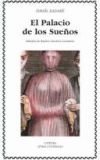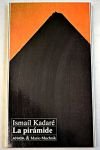
...
Unknown
Abril quebrado, una de las principales novelas del escritor albanés Ismail Kadare, publicada por primera vez en Tirana en 1978. Hay dos ediciones españolas, la primera editada en 1990 en Barcelona por Muchnik Editores, y la segunda en Madrid en 2001, en la Biblioteca Kadaré de la editorial Alianza. El traductor al …
541069152442946072662054075408204213292715411

 English
English Español
Español Deutsch
Deutsch








